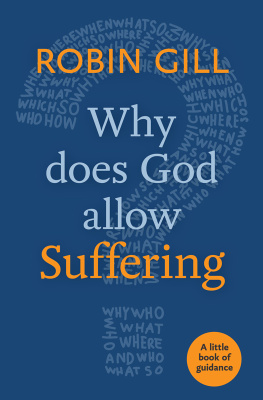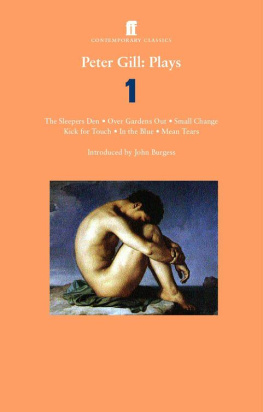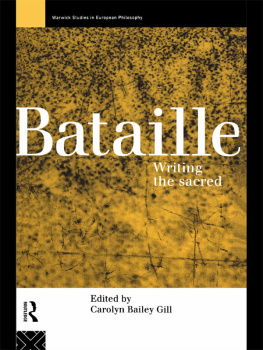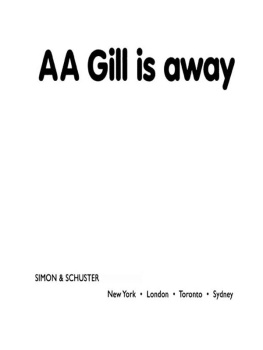John Gill - John Gill’s Exposition of the Entire Bible
Here you can read online John Gill - John Gill’s Exposition of the Entire Bible full text of the book (entire story) in english for free. Download pdf and epub, get meaning, cover and reviews about this ebook. year: 0, publisher: freegrace.net, genre: Religion. Description of the work, (preface) as well as reviews are available. Best literature library LitArk.com created for fans of good reading and offers a wide selection of genres:
Romance novel
Science fiction
Adventure
Detective
Science
History
Home and family
Prose
Art
Politics
Computer
Non-fiction
Religion
Business
Children
Humor
Choose a favorite category and find really read worthwhile books. Enjoy immersion in the world of imagination, feel the emotions of the characters or learn something new for yourself, make an fascinating discovery.

John Gill’s Exposition of the Entire Bible: summary, description and annotation
We offer to read an annotation, description, summary or preface (depends on what the author of the book "John Gill’s Exposition of the Entire Bible" wrote himself). If you haven't found the necessary information about the book — write in the comments, we will try to find it.
John Gill’s Exposition of the Entire Bible — read online for free the complete book (whole text) full work
Below is the text of the book, divided by pages. System saving the place of the last page read, allows you to conveniently read the book "John Gill’s Exposition of the Entire Bible" online for free, without having to search again every time where you left off. Put a bookmark, and you can go to the page where you finished reading at any time.
Font size:
Interval:
Bookmark:
John Gill's Exposition of the Entire Bible
Genesis 1:1
INTRODUCTION TO GENESIS
This book, in the Hebrew copies of the Bible, and by the Jewish writers, is generally called Bereshith, which signifies "in the beginning", being the first word of it; as the other four books of Moses are also called from their initial words. In the Syriac and Arabic versions, the title of this book is "The Book of the Creation", because it begins with an account of the creation of all things; and is such an account, and so good an one, as is not to be met with anywhere else: the Greek version calls it Genesis, and so we and other versions from thence; and that because it treats of the generation of all things, of the heavens, and the earth, and all that are in them, and of the genealogy of men: it treats of the first men, of the patriarchs before the flood, and after it to the times of Joseph. It is called the "first" book of Moses, because there are four more that follow; the name the Jewish Rabbins give to the whole is hrwt yvmwx hvmx , "the five fifths of the law", to which the Greek word "pentateuch" answers; by which we commonly call these books, they being but one volume, consisting of five parts, of which this is the first. And that they were all written by Moses is generally believed by Jews and Christians. Some atheistical persons have suggested the contrary; our countryman Hobbes {a} would have it, that these books are called his, not from his being the author of them, but from his being the subject of them; not because they were written by him, but because they treat of him: but certain it is that Moses both wrote them, and was read, as he was in the Jewish synagogues, every sabbath day, which can relate to no other writings but these, Joh 1:45 . And Spinosa, catching at some doubts raised by Aben Ezra on De 1:1 concerning some passages which seemed to him to have been added by another hand, forms objections against Moses being the author of the book of Genesis; which are sufficiently answered by Carpzovius {b}. Nor can Ezra be the author of the Pentateuch, as Spinosa suspects; since it is plain these writings were in being before his time, in the times of Josiah, Amaziah, yea, of David, and also of Joshua, 2Ch 34:14 nay, they are even referred to in the book of Ezra as the writings of Moses, Ezr 3:2 to which may be added, in proof of the same, De 31:9 . Nor are there any other writings of his authentic; what are ascribed to him, as the Analepsis of Moses, his Apocalypse, and his Last Will and Testament, are apocryphal. That this book of Genesis particularly was written by him, is evident from the testimony of Philip, and even of our Lord Jesus Christ, who both testify that he wrote concerning the Messiah, Joh 1:45 as he did in this book, where he speaks of him as the seed of the woman that should break the serpent's head; as the seed of Abraham, in whom all the nations of the earth should be blessed; and as the Shiloh, to whom the gathering of the people should be, Ge 3:15 . Nor is there any reason to believe that he wrote this book from the annals of the patriarchs, since it does not appear, nor is it very probable, that they had any; nor from traditions delivered down from one to another, from father to son, which is more probable, considering the length of the lives of the patriarchs: but yet such a variety of particulars respecting times, places, persons, their genealogies and circumstances, so nicely and exactly given, can scarcely be thought to be the fruit of memory; and much less is it to be imagined that he was assisted in it by Gabriel, when he lived in solitude in Midian: but it is best of all to ascribe it to divine inspiration, as all Scripture is by the apostle, 2Ti 3:16 for who else but God could have informed him of the creation, and the manner and order in which every creature was brought into being, with a multitude of things recorded in this book? the design of which is to lead men into the knowledge and worship of the one true God, the Creator of all things, and of the origin of mankind, the fall of our first parents, and their posterity in them; and to point at the means and method of the recovery of man by the Messiah, the promised seed; and to give an account of the state and case of the church of God, in the times of the patriarchs, both before and after the flood, from Adam, in the line of Seth, to Noah; and from Noah to the times of Joseph, in whose death it ends: and, according to Usher {c}, it contains an history of two thousand, three hundred, and sixty nine years.
{a} Leviath. par. 3. c. 33. {b} Introduct. ad Libr. Bib. V. T. c. 4. sect. 2. {c} Annal. Vet. Test. p. 17.
INTRODUCTION TO GENESIS 1
This chapter contains an account of the creation of the universe, and all things in it; asserts the creation of the heaven and earth in general, and describes the state and condition of the earth in its first production, Ge 1:1 and then proceeds to declare the work of each of the six days of creation, and to give an account of light, its separation from darkness and the names of both, the work of the first day, Ge 1:3 of the firmament, its use and name, the work of the second day, Ge 1:6 of the appearance of the earth, and the production of grass, herbs, and trees in the earth, the work of the third day, Ge 1:9 of the sun, moon, and stars, their situation, and use, the work of the fourth day, Ge 1:14 of the fowls of the air, and the fishes of the sea, the work of the fifth day, Ge 1:19 of all kinds of cattle, and beasts, and creeping things, Ge 1:24 and then of man, created male and female, after the image of God, having a grant of dominion over the rest of the creatures, the fruit of divine consultation, Ge 1:26 and of a provision of food for man and beast, Ge 1:29 . And the chapter is concluded with a survey God took of all his works, and his approbation of them; all which were the work of the sixth day, and closes the account of the creation in that space of time, Ge 1:31 .
Ver. 1. In the beginning God created the heaven and the earth. By the heaven some understand the supreme heaven, the heaven of heavens, the habitation of God, and of the holy angels; and this being made perfect at once, no mention is after made of it, as of the earth; and it is supposed that the angels were at this time created, since they were present at the laying of the foundation of the earth,
Job 38:6 but rather the lower and visible heavens are meant, at least are not excluded, that is, the substance of them; as yet being imperfect and unadorned; the expanse not yet made, or the ether and air not yet stretched out; nor any light placed in them, or adorned with the sun, moon, and stars: so the earth is to be understood, not of that properly so called, as separated from the waters, that is, the dry land afterwards made to appear; but the whole mass of earth and water before their separation, and when in their unformed and unadorned state, described in the next verse: in short, these words represent the visible heavens and the terraqueous globe, in their chaotic state, as they were first brought into being by almighty power. The h prefixed to both words is, as Aben Ezra observes, expressive of notification or demonstration, as pointing at "those" heavens, and "this earth"; and shows that things visible are here spoken of, whatever is above us, or below us to be seen: for in the Arabic language, as he also observes, the word for "heaven", comes from one which signifies high or above {a}; as that for "earth" from one that signifies low and beneath, or under {b}. Now it was the matter or substance of these that was first created; for the word
ta set before them signifies substance, as both Aben Ezra and {c} Kimchi affirm. Maimonides {d} observes, that this particle, according to their wise men, is the same as "with"; and then the sense is, God created with the heavens whatsoever are in the heavens, and with the earth whatsoever are in the earth; that is, the substance of all things in them; or all things in them were seminally together: for so he illustrates it by an husbandman sowing seeds of divers kinds in the earth, at one and the same time; some of which come up after one day, and some after two days, and some after three days, though all sown together. These are said to be "created", that is, to be made out of nothing; for what pre-existent matter to this chaos could there be out of which they could be formed? And the apostle says, "through faith we understand that the worlds were framed by the word of God, so that things which are seen were not made of things which do appear", Heb 11:3 . And though this word is sometimes used, and even in this chapter, of the production of creatures out of pre-existent matter, as in Ge 1:21 yet, as Nachmanides observes, there is not in the holy language any word but this here used, by which is signified the bringing anything into being out of nothing; and many of the Jewish interpreters, as Aben Ezra, understand by creation here, a production of something into being out of nothing; and Kimchi says {e} that creation is a making some new thing, and a bringing something out of nothing: and it deserves notice, that this word is only used of God; and creation must be the work of God, for none but an almighty power could produce something out of nothing. The word used is "Elohim", which some derive from another, which signifies power, creation being an act of almighty power: but it is rather to be derived from the root in the Arabic language, which signifies to worship {f}, God being the object of all religious worship and adoration; and very properly does Moses make use of this appellation here, to teach us, that he who is the Creator of the heavens and the earth is the sole object of worship; as he was of the worship of the Jewish nation, at the head of which Moses was. It is in the plural number, and being joined to a verb of the singular, is thought by many to be designed to point unto us the mystery of a plurality, or trinity of persons in the unity of the divine essence: but whether or no this is sufficient to support that doctrine, which is to be established without it; yet there is no doubt to be made, that all the three Persons in the Godhead were concerned in the creation of all things, see Ps 33:6 . The Heathen poet Orpheus has a notion somewhat similar to this, who writes, that all things were made by one Godhead of three names, and that this God is all things {g}: and now all these things, the heaven and the earth, were made by God "in the beginning", either in the beginning of time, or when time began, as it did with the creatures, it being nothing but the measure of a creature's duration, and therefore could not be until such existed; or as Jarchi interprets it, in the beginning of the creation, when God first began to create; and is best explained by our Lord, "the beginning of the creation which God created", Mr 13:19 and the sense is, either that as soon as God created, or the first he did create were the heavens and the earth; to which agrees the Arabic version; not anything was created before them: or in connection with the following words, thus, "when first", or "in the beginning", when "God created the heavens and the earth", then "the earth was without form", &c {h}. The Jerusalem Targum renders it, "in wisdom God created"; see Pr 3:19 and some of the ancients have interpreted it of the wisdom of God, the Logos and Son of God. From hence we learn, that the world was not eternal, either as to the matter or form of it, as Aristotle, and some other philosophers, have asserted, but had a beginning; and that its being is not owing to the fortuitous motion and conjunction of atoms, but to the power and wisdom of God, the first cause and sole author of all things; and that there was not any thing created before the heaven and the earth were: hence those phrases, before the foundation of the world, and before the world began, &c. are expressive of eternity: this utterly destroys the notion of the pre-existence of the souls of men, or of the soul of the Messiah: false therefore is what the Jews say {i}, that paradise, the righteous, Israel, Jerusalem, &c. were created before the world; unless they mean, that these were foreordained by God to be, which perhaps is their sense.
Font size:
Interval:
Bookmark:
Similar books «John Gill’s Exposition of the Entire Bible»
Look at similar books to John Gill’s Exposition of the Entire Bible. We have selected literature similar in name and meaning in the hope of providing readers with more options to find new, interesting, not yet read works.
Discussion, reviews of the book John Gill’s Exposition of the Entire Bible and just readers' own opinions. Leave your comments, write what you think about the work, its meaning or the main characters. Specify what exactly you liked and what you didn't like, and why you think so.










